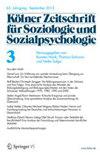宗教多样性、伊斯兰教和西欧一体化——象征性、社会和制度动态的分析
IF 0.9
3区 社会学
Q4 PSYCHOLOGY, SOCIAL
Kolner Zeitschrift Fur Soziologie Und Sozialpsychologie
Pub Date : 2023-10-17
DOI:10.1007/s11577-023-00911-5
引用次数: 0
摘要
宗教多样性,特别是伊斯兰教的存在,经常被认为是对西欧国家团结和社会凝聚力的威胁。本文回顾并综合了有关宗教与移民融合的研究文献,考察了符号、社会和制度边界过程及其潜在的微观机制。首先,它展示了宗教编码的象征性边界的相对光明,这种边界是由大多数人的反穆斯林偏见以及穆斯林宗教信仰的代际传播所维持的。其次,它讨论了宗教差异是否以及如何通过劳动力市场、教育和社会网络中的歧视和基于宗教的(自我)隔离转化为社会界限。第三,它追溯了在宪法、欧洲人权和反歧视指令的影响下,穆斯林要求承认和公共政策回应的互动序列是如何导致制度边界的转变的。文章最后讨论了象征、社会和制度边界转换的宏观过程如何相互关联的情景,从而提出了关于西欧民族国家宗教多样性和一体化的更广泛问题。本文章由计算机程序翻译,如有差异,请以英文原文为准。
Religiöse Diversität, Islam und Integration in Westeuropa – Analyse symbolischer, sozialer und institutioneller Grenzdynamiken
Abstract Religious diversity and, in particular, the presence of Islam is often perceived as a threat to national solidarity and social cohesion across Western Europe. Reviewing and synthesizing compartmentalized research literature on religion and immigrant integration, this article scrutinizes symbolic, social, and institutional boundary processes and their underlying micro-level mechanisms. First, it showcases the relative brightness of religiously coded symbolic boundaries that is sustained by anti-Muslim prejudices among the majority as well as by the intergenerational transmission of Muslim religiosity. Second, it discusses whether and how religious differences translate into social boundaries, through both discrimination and religiously based (self-)segregation on the labor market, in education, and in social networks. Third, it traces how interactive sequences of Muslims’ claims for recognition and public policy responses have led to institutional boundary shifts under the influence of constitutional law and European human rights and anti-discrimination directives. The article concludes by discussing scenarios of how macro-level processes of symbolic, social, and institutional boundary transformation interrelate, thus raising broader questions on religious diversity and integration in Western European nation-states.
求助全文
通过发布文献求助,成功后即可免费获取论文全文。
去求助
来源期刊
CiteScore
2.30
自引率
6.70%
发文量
55
期刊介绍:
The sociology journal Kölner Zeitschrift für Soziologie und Sozialpsychologie (KZfSS) ("Cologne Journal of Sociology and Social Psychology") was founded in 1948 by the Cologne sociologist Leopold von Wiese as the Kölner Zeitschrift für Soziologie. His successor, René König, broadened the journal''s scope towards social psychological topics, including cultural sociology and qualitative social research, which gave the journal its current name.
KZfSS is the most important sociological publication in the German-speaking world in terms of its scope and distribution. It publishes comprehensively on German sociological research in all disciplines and regularly communicates research results from many countries around the world.
KZfSS follows the model of a universal sociology journal. In addition to more than 40 double-blind peer-reviewed original research articles per year, it publishes detailed literature reviews and book reviews of German and international literature in a comprehensive review section. The journal thus provides a forum for sociological research and open discussion. Special emphasis is placed on offering young colleagues an opportunity for their first publication.
The journal is included in many renowned scientific Abstracting & Indexing databases such as the Social Science Citation Index.
In addition to the four annual issues, a supplement coordinated by guest editors is published annually.

 求助内容:
求助内容: 应助结果提醒方式:
应助结果提醒方式:


